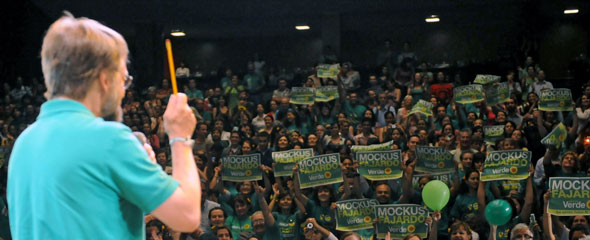
Presidential candidate Antanas Mockus, who as mayor of Bogotá once asked residents to voluntarily pay more taxes, is making a campaign pledge that would have most politicians trembling: higher taxes.
Mr. Mockus has gone from running a quixotic presidential campaign to becoming one of the top two contenders to succeed President Álvaro Uribe in elections on May 30. He is running neck and neck in the polls with former Defense Minister Juan Manuel Santos, who is seen as Mr. Uribe’s political heir. The latest polls indicate that Mr. Mockus would win in a runoff.
Mr. Mockus, a mathematician and former university dean, recently addressed thousands of his followers in this sweltering border town with promises of higher taxes and clean government.
Mockus adviser Salomon Kalmanovitz, a former central bank director who is viewed as a potential finance minister, said a Mockus administration would put an end to the tax breaks and loopholes that allow corporations to pay much less than the headline 33% corporate tax rate.
The pledge to raise taxes may be popular with Colombia’s poor, who pay little in taxes and would be less affected by Mr. Mockus’s increases than the rich. Yet it is also stoking fears that a Mockus administration could diverge from some of Mr. Uribe’s market-friendly policies that helped Colombia attract international investors.
Mr. Santos, meanwhile, promises to dismantle a financial-transactions tax that individuals and businesses pay for various banking operations. His economic platform, which centers on building up the country’s shaky infrastructure, doesn’t mention raising taxes. The Santos campaign has assailed Mr. Mockus’s economic plan, saying it wouldn’t create jobs.
Mr. Mockus has responded by saying that he would continue attracting foreign investment flows to Colombia and that he believes in free markets. Throughout the campaign, tax increases have been at the heart of his economic proposals.
Critics on the left have branded Mr. Mockus as a conservative for the efforts he made to control public spending during his time as mayor and for overseeing the partial privatization of utility companies. Detractors on the right say his plan to raise taxes could jeopardize economic growth.
His presidential campaign turned down a chunk of the state financing that political parties in Colombia receive and said that the money should be spent on building schools.
“We are fiscally prudent. Public funds should be treasured and used with much care,” said Mr. Kalmanovitz.
In an interview with Dow Jones Newswires, Mr. Kalmanovitz said “To maintain economic growth, we need to increase tax collection.”
For Mr. Mockus, who has a master’s degree in philosophy, raising taxes is not only a matter of economics, but also ethics. “We all pay taxes for the common good,” Mr. Mockus said in a recent interview. “If we want a series of rights written in the constitution to be granted, we need more funds and more honesty.”
“There is no opposition to that level of taxes, on the contrary there is more demand for a better public service,” he added.
Statements like that are scaring some companies in Colombia.
“We consider the current level of tax rates is already pretty high,” said Carlos Urrea, vice president of the country’s largest lingerie maker, Leonisa SA. “The country must stay tax-competitive.”
On top of the changes to the corporate tax code, Mr. Mockus’s economic team plans to broaden the range of products that are charged with a value-added tax, as well as raise taxes on the wealthy.
“The impact could be very harmful,” said Andres Jimenez, an analyst with local stock brokerage firm Interbolsa SA. “The next president should focus on getting more people to pay taxes and fighting tax evasion, not on hiking taxes on the companies and people that are already paying for everything.”
One of most contentious tax breaks is for free-trade zones, which reduce the corporate tax rate to 15%. Companies investing in free-trade zones are also exempted from paying value-added tax and tariffs on imported capital goods and some raw materials.
Mr. Mockus wants to stop granting new free-trade zones and to get all companies to pay full taxes, but says existing free-trade zones would remain intact. Even people working in free-trade zones consider the system too generous.
“When you earn a good living, you can afford to pay taxes,” said the chief financial officer of a foreign company working in a free-trade zone, who asked to remain anonymous. The country needs more spending on infrastructure, including roads and ports, as well as in education to get skilled workers, the executive said.
According to Mr. Mockus, competitiveness doesn’t hinge on tax rates. “We believe a country is attractive not only with its tax level or tax breaks. I think being protected from corruption and violence is more important than one or two points of corporate tax,” he said.
Some economists say that higher taxes, if spent well, could help the country improve its competitiveness over the medium term, but recognize that there are uncertainties about how an eventual Mockus administration would translate their theories into practice.
Many businessmen say this will be a tough sell for Mr. Mockus, because Colombians—especially wealthy ones—will be reluctant to pay more taxes in the short-term.
“Nobody that has money and a good income wants to pay higher taxes,” said Mr. Jimenez, of Interbolsa SA. (Inti Landauro, Darcy Crowe / Dow Jones)

